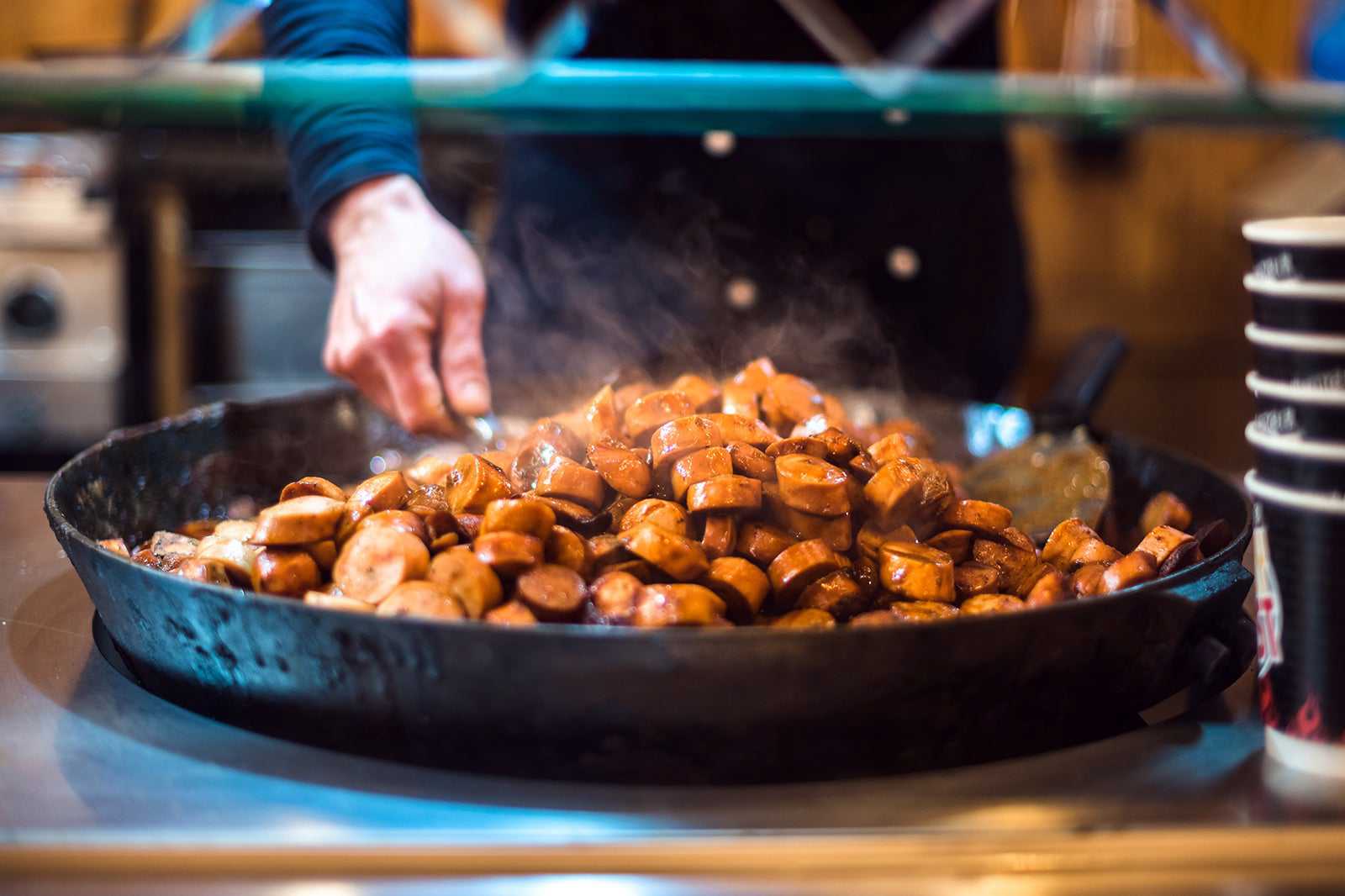Curious about what Manchester locals love to eat or wish to explore some distinctive culinary favourites around this part of North West England? Take note though, England’s high population density and the industrialisation of food production have largely made regional cuisines redundant. What people eat in Manchester isn’t dissimilar to the diet found in other large cities around the world.
Even so, the Greater Manchester area does retain some specific foods which residents would deem local specialities. While you can buy some in supermarkets nationwide, you’d be hard-pressed to find others outside North West England. Check out our guide to real dishes locals love to eat in Manchester.
- 1
Parched peas
A winter-favourite speciality in Northern England

- 食事
Parched peas (or black peas) are called black badgers or Carlin peas in other parts of Northern England. These peas are left to dry in the fields before they are harvested and boiled with water to rehydrate them. That process is called parching, hence the name. When done, they should be slightly al dente and served with vinegar, salt and pepper.
Parched peas are eaten across Lancashire and Greater Manchester. They're especially popular in Manchester on Bonfire Night, celebrated each year on 5th November. You’ll also find street vendors selling parched peas at the Manchester Christmas Markets.
- 2
Eccles cake
A sweet baked treat

- 食事
Eccles cakes aren’t really cakes in the usual sense. Instead, they are a deliciously flaky puff pastry chock full of currants and topped with a generous sprinkle of sugar. The name comes from the town of Eccles, which is in Greater Manchester. However, you’ll find Real Lancashire Eccles Cakes, one of the largest companies still making authentic Eccles cakes, in Ardwick.
Oliver Cromwell banned them for a time in the 17th century, claiming they were a pagan creation. By and large, people ignored him and fortunately, the ban was overturned. James Birch was the first commercial baker to sell them. He opened his Eccles premises in 1793, though you’ll now find them much further afield.
- 3
Rag pudding and pasty barms
A hearty fare that’s both filling and tasty

- 食事
Rag pudding is a throwback to North West England’s industrial heritage. Working long hours through cold winters created a need for meals that would provide energy. As a result, rag pudding was invented in neighbouring Oldham. It comprises minced meat and onions encased in a suet pastry.
The pasty barm, a meat-and-potato pie eaten inside a bread roll, is another popular stomach filler. The term barm refers to the leavening agent, which is the foam that’s a by-product of beer production. Although working and living conditions have improved immensely, you’ll still find plenty of people throughout Greater Manchester with a passion for these heritage foods.
- 4
Black pudding
A breakfast favourite that’s great with a fry-up

- 食事
Black pudding originated in Bury, a market town in Greater Manchester. It’s not actually a pudding, but a type of blood sausage using pork blood. Unlike European blood sausages, however, it has a higher cereal content. Across the north-west, including Manchester, people love to eat it as part of a traditional fry-up.
It’s worth making a trip to the town’s market to visit the Bury Black Pudding Co, an award-winning producer with a 100-year-long history. You will also enjoy watching the World Black Pudding Throwing Championships, which take place in nearby Ramsbottom in September. The custom dates back to 1455 but is still a popular spectator event today.
- 5
Manchester tart
A classic tart based on Mrs Beeton’s original pudding

- 食事
Manchester tart‘s popularity can be explained in part by childhood nostalgia – until a few decades ago, it was part of school lunches in the city. Layers of raspberry jam, custard and flakes of coconut fill a shortcrust pastry shell that's topped with a maraschino cherry and white icing. One of the best places to buy one is at Robinson’s Artisan Family Bakery near Manchester City’s football ground – it’s the oldest bakery in Manchester, having opened in 1864.
Confusingly, it’s similar though not identical to Manchester pudding. That is an endangered dish which predates the tarts that a 19th-century cook called Mrs Beeton featured in her famous cookbook. This baked treat has a plain or puff-pastry base covered with jam and a lemon-flavoured custard thickened with breadcrumbs.



















